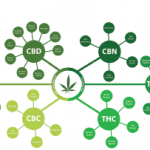There are 104 known cannabinoids or active chemical compounds in marijuana. The best known is THC (tetrahydrocannabinol) and the second is CBD (cannabidiol). “The cannabis industry tells us CBD is really important, but that’s not yet based on data. And we can’t trust what we read on the Internet,” he said.
We do know cannabis can stimulate the appetite, reduce anxiety, change our pain threshold and impair short-term memory. “It’s not addictive in any comparable way to opioids,” Dr. Piomelli said. It delivers a subtle series of effects, which is no accident given that THC binds to abundant cannabinoid receptors in neurons and immune cells in the brain and throughout the body that serve multiple functions. The body also produces its own endocannabinoid neurotransmitters, which someday could provide signals for developing new therapies.
There’s a long list of purported therapeutic indications for which little evidence exists. “Those supported by the data are actually quite few,” Dr. Piomelli said, citing a January 2017 report by the National Academy of Sciences (NAS), The Health Effects of Cannabis and Cannabinoids.4 It found evidence supporting the treatment of:
- Chronic pain;
- Nausea/vomiting;
- Multiple sclerosis spasticity symptoms; and
- Short-term sleep outcomes.
But the NAS found limited or insufficient evidence for cannabis’ effectiveness with other conditions, such as glaucoma, cancer, epilepsy, irritable bowel syndrome, ALS, Parkinson’s disease or migraines. Potential risks include use during pregnancy and lactation, and effects on the brain when used during adolescence. “There’s a lot more work we need to do as researchers, and a gap between what society thinks vs. the actual data. My excuse as a scientist is that state and federal laws [limiting access to controlled substances for research] have made my job almost impossible,” he said.
One participant at the session asked what physicians and the rheumatology community can do to educate front-line providers. “Patients ask me about cannabis, and I’m clueless. There is such a wide gap in our knowledge.”
Dr. Piomelli said doctors and nurses need more education as part of a concerted effort to raise awareness. “I’m concerned about the staff in marijuana dispensaries,” he added. He said 90% give advice about marijuana’s therapeutic use, but only 10% have received any training about the actual therapeutics. “We can’t just say, ‘Oh, this is crazy,’ and do nothing.”
Larry Beresford is a freelance medical journalist in Oakland, Calif.
References
- Pacula RL, Smart R. Medical marijuana and marijuana legalization. Annu Rev Clin Psychol. 2017 May 8;13:397–419.
- Bachhuber MA, Saloner B, Cunningham CO, et al. Medical cannabis laws and opioid analgesic overdose mortality in the United States, 1999–2010. JAMA Intern Med. 2014 Oct;174(10):1668–1673.
- Fitzcharles MA, Baerward C, Ablin J, et al. Efficacy, tolerability and safety of cannabinoids in chronic pain associated with rheumatic diseases (fibromyalgia syndrome, back pain, osteoarthritis, rheumatoid arthritis): A systematic review of randomized controlled trials. Schmerz. 2016 Feb;30(1):47–61.
- National Academies of Sciences, Engineering, and Medicine. The health effects of cannabis and cannabinoids: Current state of evidence and recommendations for research. Washington, DC: National Academies Press (US); 2017 Jan 12.



